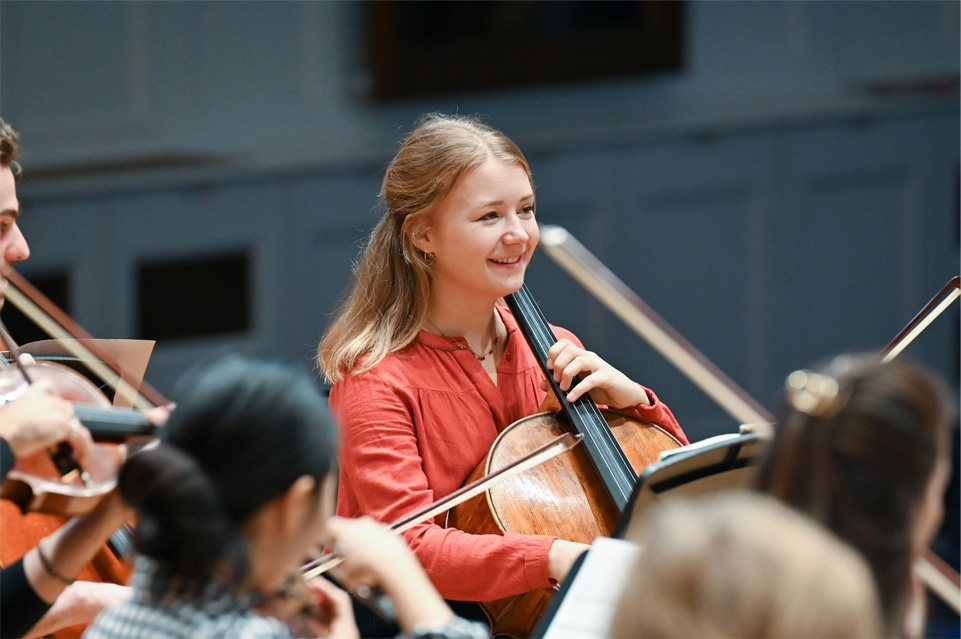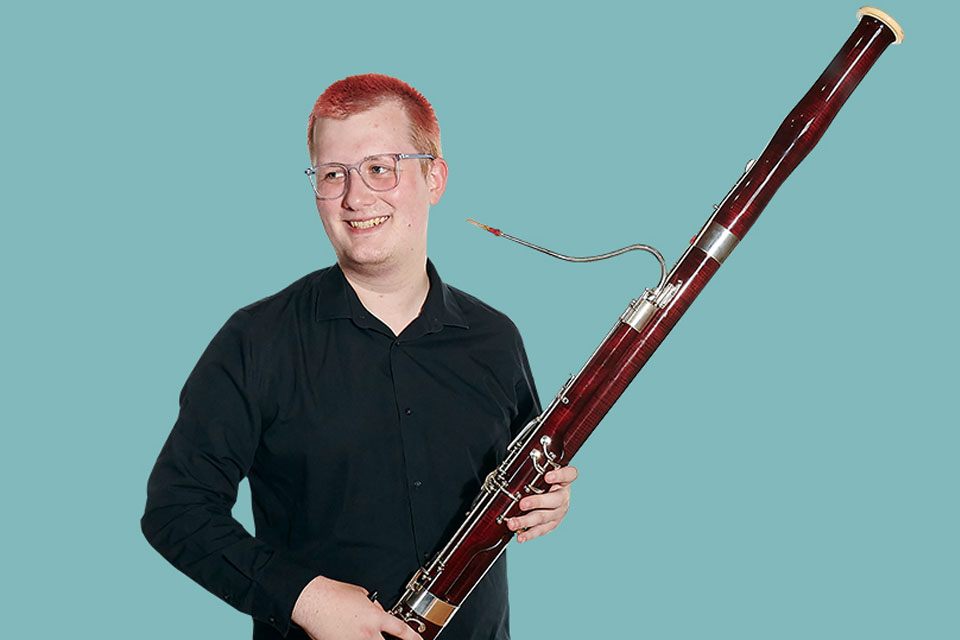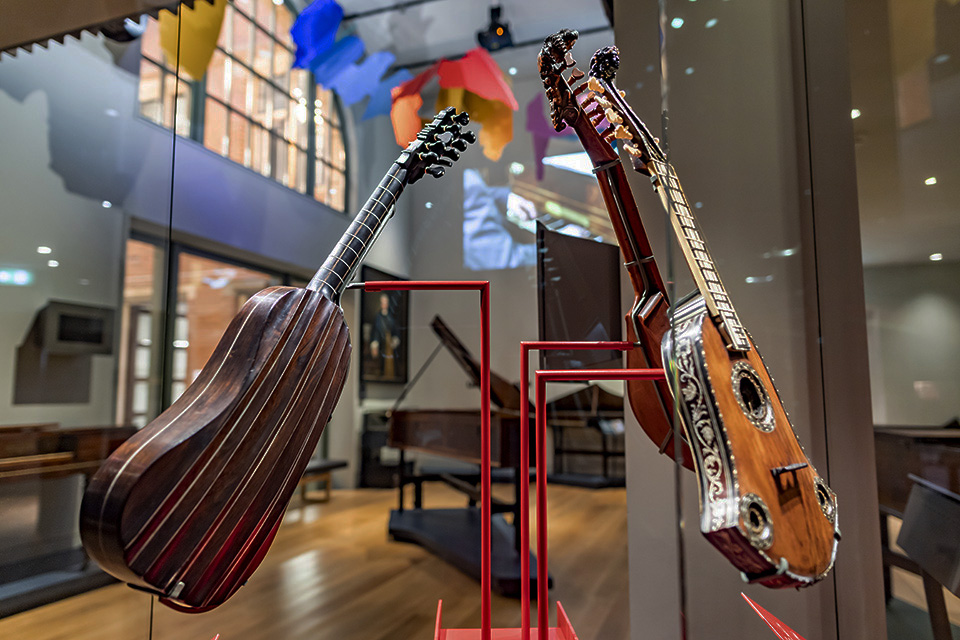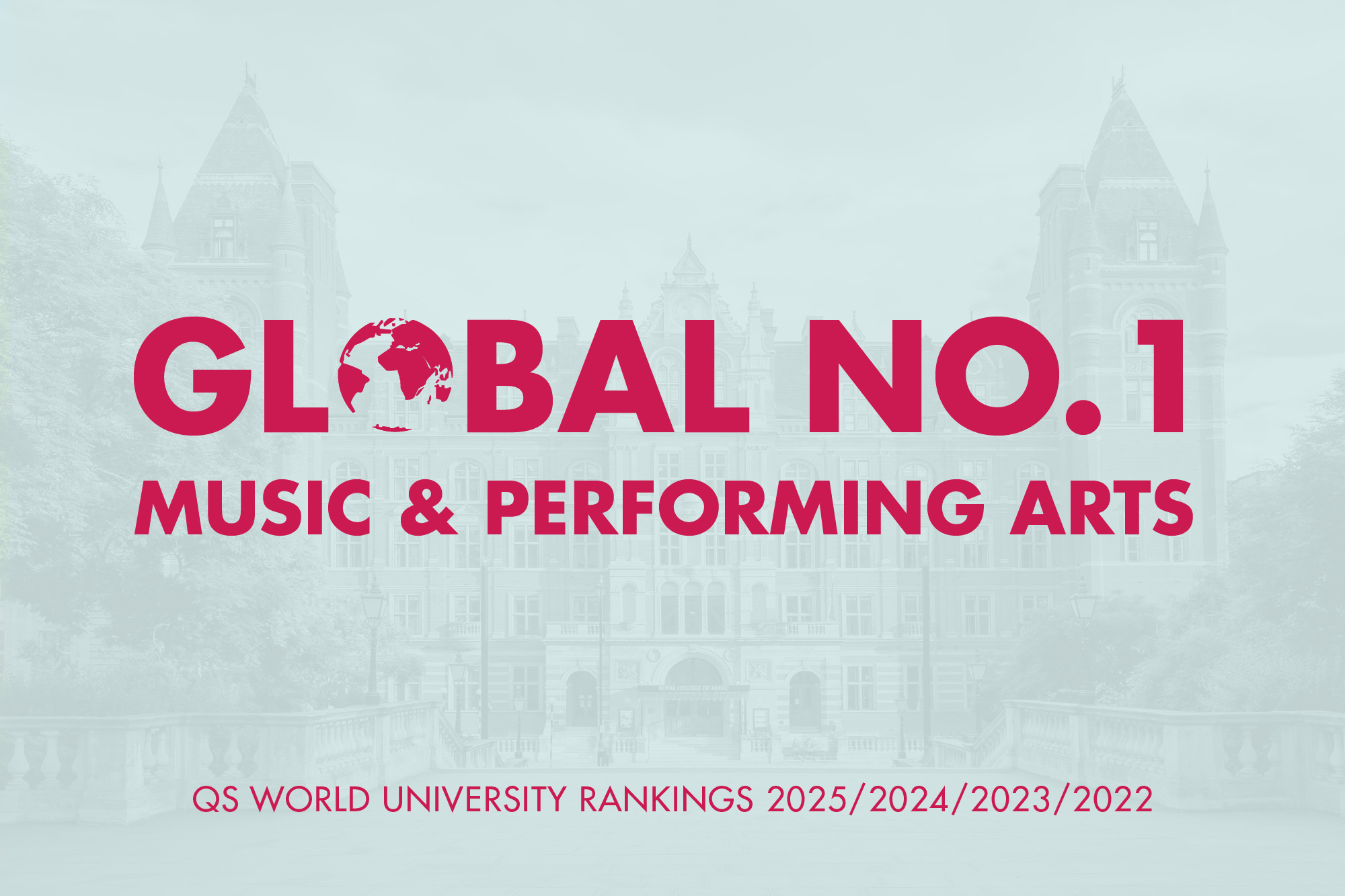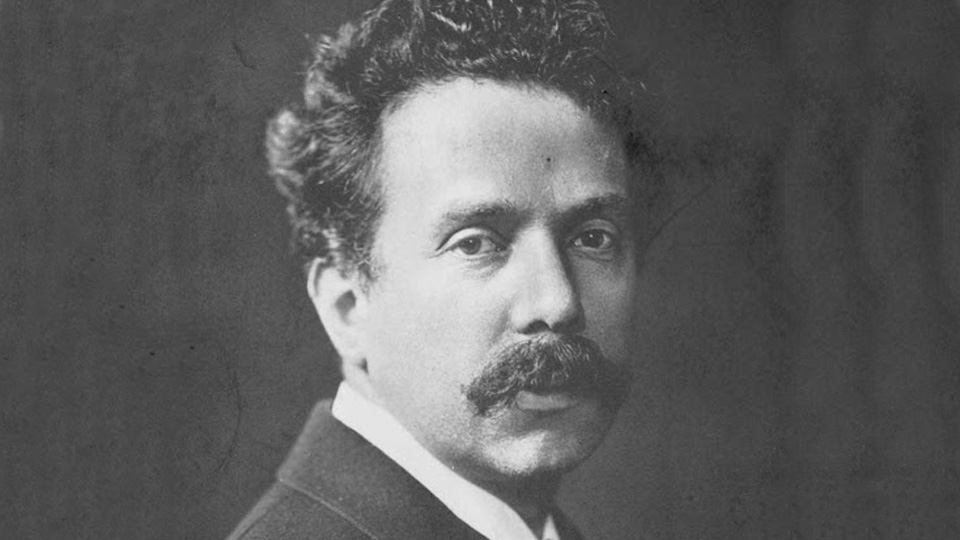In 2012 I found a beautifully bound volume of selected songs by Robert Kahn for high voice, with texts in German and English, on the shelves of the RCM Library. It had been published in the early years of the 20th century by F.E.C. Leuckart in Leipzig, and is likely to have been in the library since then. Everything about this edition looked familiar, just like older volumes of songs by Schubert, Schumann, Brahms or Wolf which we often use in our Lieder classes at the RCM. The poets Kahn had set, Christian Morgenstern, Gerhard Hauptmann, Paul Heyse, Eduard Mörike, Friedrich Rückert, and of course Goethe, were all familiar names, and the musical writing looked instantly attractive and accessible. I then discovered that Kahn had published over 300 vocal compositions and over 100 choral pieces during his life, and given the quality of the music, I was hugely surprised that I had never heard of him before.
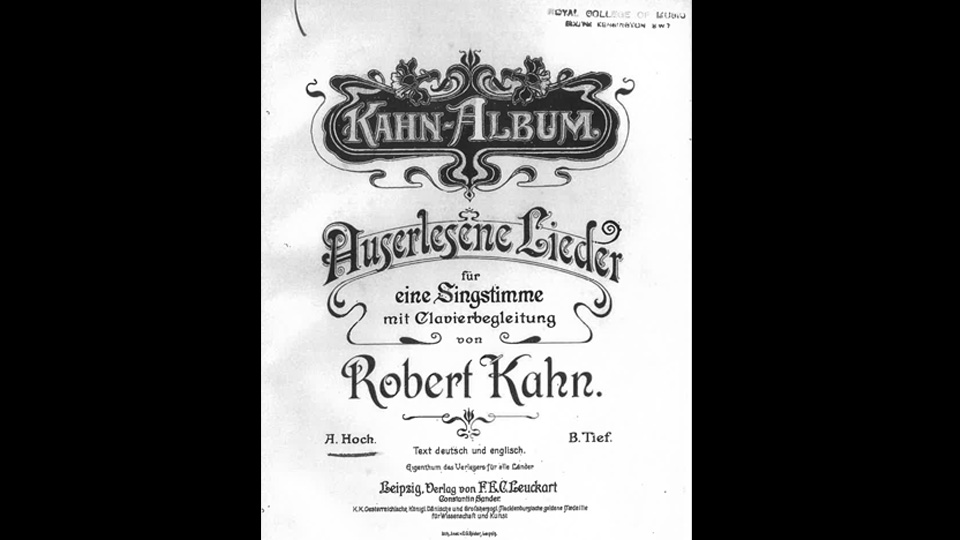
Since then I have performed and coached Kahn’s songs on many occasions and found them to be immensely satisfying. Everything about them represents the art of Lieder at its best, with idiomatic vocal writing and text setting. He had a real gift for melody and demonstrated complete mastery of harmony as a means to create powerful emotional responses and evoke images of nature and the human condition. The piano writing is also impeccable. Kahn, an accomplished pianist, clearly knew how to make the most of the instrument’s possibilities, and it comes to no surprise that a celebrated Lieder singer like the baritone Johan Messchaert (1857-1922) would have championed his songs. A large number of Kahn’s songs were originally written for medium and lower voices, perfect for high baritone or mezzo soprano. There are however notable exceptions like most of op. 16, the first five of the Morgenstern Lieder op. 31 or all of op. 58, which are well-suited to soprano or tenor voices. In recent student performances at the RCM we were able to find songs suitable for all voice types in the original keys. Kahn himself published some of his most popular songs in transposition for high voice, and many more of his songs can be transposed successfully to suit a variety of singers.
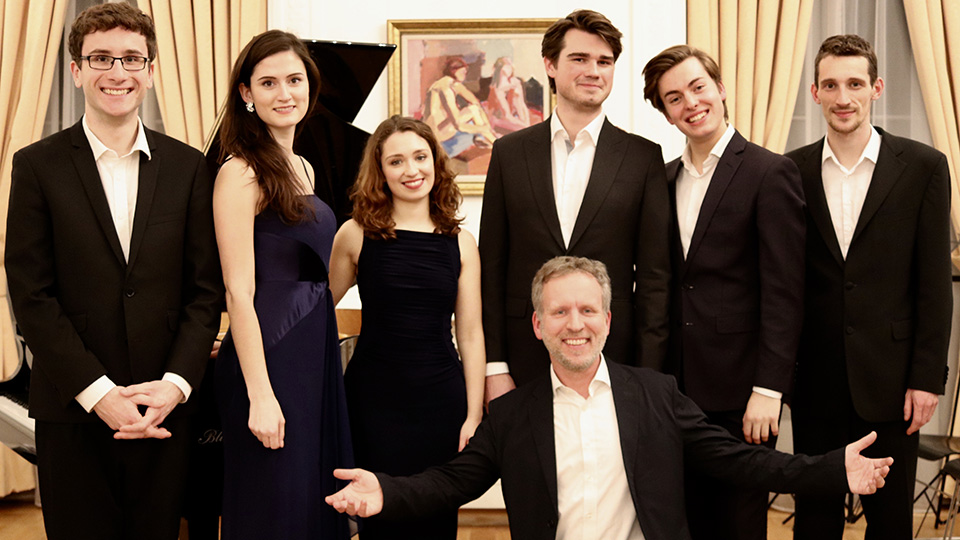
RCM students give a concert with lieder by Robert Kahn at German Embassy London in 2018, credit Norbert Meyn
Unlike the songs of Richard Strauss (1864-1949) who was Kahn’s nearly exact contemporary, Kahn's lieder avoid operatic virtuosity but instead aim for sincerity, naturalness, simplicity and truthful musical expression. For example, Obdach der Liebe (Shelter of Love, Rückert) op. 6, no. 5, one of Kahn’s earliest songs, speaks of a traveller who finds the love of his life while taking shelter from a storm. In a simple pattern of repeated chords he gradually raises the harmonic temperature until he arrives at the moment when the life-changing encounter of the two lovers takes place, with the words ‘und fand’ (and found) set as an upwards leap over a full octave. This song must have had a special significance for Kahn since he chose the name Obdach for his country house in Feldberg in northern Germany. Liebestrost (Consolation of Love, Klett), op. 42, no. 10 is reminiscent of Brahms’s Feldeinsamkeit (op. 86 no. 2) and achieves a wonderfully peaceful atmosphere in which to contemplate the consolation of love with sonorous chords in a gently heaving movement. The epic Präludium from the Morgenstern Songs op. 31, no. 1 which also exists in an orchestrated version, lifts the soul into the heavenly realms of beauty through singing. In its expansive and surging phrases it radiates a powerful and optimistic vision for music itself.
Kahn set many poems that had been set previously by other Lieder composers, but he was always able to add his individual perspective to them. His settings of poems by Mörike such as Der Gärtner (op. 16, no. 1), Der Knabe und das Immlein (op. 16, no. 7) or Gebet (op. 47, no. 9) compare favourably with those of Hugo Wolf, and his Goethe settings Auf dem See (op. 20, no. 5) and Ich denke dein (op. 6, no. 7) can stand proudly next to those by Schubert or Schumann. Kahn’s friendship with the poets Christian Morgenstern and Gerhard Hauptmann both resulted in a significant body of musical settings of their poetry. Morgenstern’s often humorous poetry is still popular in Germany today, but Kahn chose many of his more serious poems which are equally impressive. I have also enjoyed exploring his settings of Gerhard Hauptmann’s poems (opp. 27 and 40) that reflect the deep reverence he felt for the most prominent German playwright of the time whose friendship he cherished.
Kahn’s vocal ensembles and choral works are another treasure trove for singers. The Duets op. 21 and 43 contain pleasing works that are as successful in performance as similar duets by Schumann or Mendelssohn. The flirtatious Der Edelknabe und die Müllerin (Goethe), op. 43, no. 1 in which a miller’s daughter mocks the advances of a passing nobleman, or the magical Zwiegespräch der Elfen (Reinick), op. 21, no. 3 in which two excited elves eavesdrop on a pair of lovers, are just two examples that were singled out by audience members after performances. We have also had enthusiastic responses after performing some of the 21 Canons for Two Voices and Piano op. 83 (1932): Leise Töne der Brust (no. 5), a yearning love song and Geniesset den Mai (no. 15), a short and joyful call to enjoy spring, were particular audience favourites. These canons are highly unusual in the Lieder repertoire but can bring colour and variety to recitals. The two voices are usually a third, fourth or fifth apart. There are also the 24 Canons op. 66 and another 25 in op. 78, where the voices are at the same pitch. Kahn’s compositions for 3-part female choir and piano like op. 17 and 70 can easily be cast with soloists, and performances with RCM student soloists of the op. 32 songs for four-part mixed choir (or solo quartet) with piano accompaniment were also very well received. Like Brahms’s Liebesliederwalzer op. 52 they can be sung by soloists or chamber choir. I think the two works would complement each other perfectly if programmed alongside each other.

In March 2019, 12 students and professors from the RCM presented a programme of lieder and music by Robert Kahn at the Akademie der Künste Berlin. Credit - Norbert Meyn
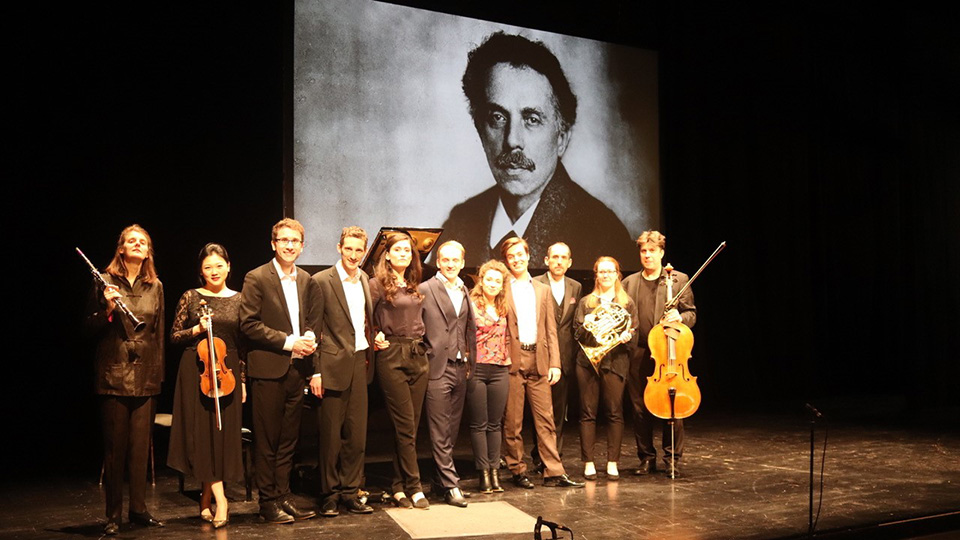
Musicians at the Sprudeling Fountain. Credit - Norbert Meyn


